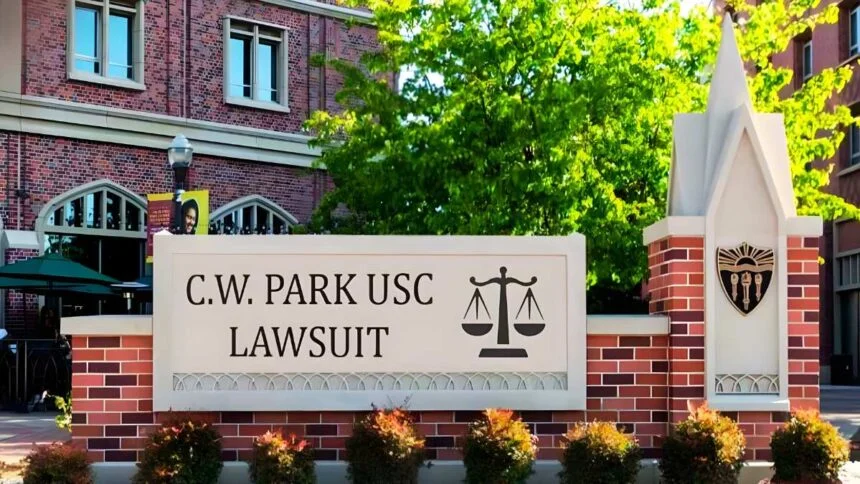Blog
The C.W. Park USC Lawsuit_ An In-Depth Examination
Published
9 months agoon
By
TONY GRAY
The C.W. Park USC lawsuit has captured the attention of both legal experts and the academic community, highlighting critical issues within higher education institutions. As the case unfolds, it sheds light on complex dynamics, including allegations of discrimination, tenure disputes, and the broader implications for university governance. This article delves deep into the lawsuit, examining the background, key players, legal arguments, and the potential impact on future academic policies.
The Background of the C.W. Park USC Lawsuit
The lawsuit involving C.W. Park and the University of Southern California (USC) stems from a complex series of events that have brought significant attention to the functioning of higher education institutions. Park, a distinguished professor with a long-standing history at USC, initiated the lawsuit after a series of alleged discriminatory practices that affected his professional standing and tenure.
At the core of the dispute is Park’s claim that the university engaged in unfair practices, including racial discrimination, that impeded his career advancement. These allegations are part of a broader narrative about how tenure decisions and faculty evaluations are conducted, raising questions about transparency, fairness, and accountability within academic institutions.
Key Players in the Lawsuit
Understanding the key players in this lawsuit is crucial to grasping its significance. C.W. Park, a respected scholar with numerous accolades, represents the plaintiff in the case. His career at USC spans several decades, during which he made significant contributions to his field. On the other side, USC’s administration, including senior officials responsible for faculty evaluations and tenure decisions, are at the heart of the defense.
The legal teams representing both sides are also pivotal in shaping the direction of the case. Park’s legal counsel has emphasized the alleged discriminatory practices, while USC’s defense has focused on the legitimacy of their tenure review process and adherence to university policies. The involvement of these key players will undoubtedly influence the outcome of the lawsuit and its implications for academia.
Legal Arguments Presented in the Case
The legal arguments presented in the C.W. Park USC lawsuit are multifaceted and highlight critical issues related to employment law, discrimination, and academic governance. Park’s legal team has argued that the university violated his civil rights by engaging in discriminatory practices that hindered his career progression. These claims are supported by evidence of alleged biased evaluations and the denial of tenure opportunities based on race.
USC’s defense, however, counters these allegations by asserting that their tenure and evaluation processes are fair, transparent, and in line with institutional policies. They argue that Park’s claims lack substantial evidence and that the decisions made regarding his tenure were based on merit and academic performance, not discriminatory factors.
The Role of Tenure in the Dispute
Tenure is a critical component of the academic profession, providing job security and academic freedom to faculty members. In the context of the C.W. Park USC lawsuit, tenure plays a central role in the dispute. Park alleges that the denial of tenure was not based on his academic qualifications or contributions but rather on discriminatory practices.
The lawsuit brings to the forefront the challenges and controversies surrounding tenure decisions. It raises important questions about how tenure is awarded, the criteria used in evaluations, and the potential for bias in these decisions. The outcome of this case could have far-reaching implications for how tenure is granted and challenged in the future.
Allegations of Discrimination: A Closer Look
The allegations of discrimination are at the heart of the C.W. Park USC lawsuit. Park claims that he was subjected to racial bias that affected his career advancement and ultimately led to the denial of tenure. These allegations are not just about individual grievances but speak to broader issues of diversity, equity, and inclusion within academia.
The case highlights the need for universities to critically examine their policies and practices to ensure that they promote fairness and equality. It also underscores the importance of addressing systemic issues that may contribute to discriminatory practices, whether intentional or unconscious, in academic institutions.
The Impact on USC’s Reputation
The lawsuit has had a significant impact on USC’s reputation, both within the academic community and in the public eye. As the case continues to unfold, it has drawn attention to the university’s handling of tenure decisions and its commitment to diversity and inclusion.
Negative publicity from the lawsuit could have long-term consequences for USC, affecting its ability to attract top talent, secure funding, and maintain its standing as a leading academic institution. The outcome of the case will likely influence public perception of the university and its commitment to upholding ethical standards.
Broader Implications for Academia
The C.W. Park USC lawsuit has broader implications for academia, particularly in how tenure decisions are made and how allegations of discrimination are addressed. The case serves as a reminder of the importance of transparency, fairness, and accountability in academic institutions.
It also highlights the need for systemic changes to ensure that all faculty members, regardless of race or background, have equal opportunities for career advancement. The outcome of this case could set a precedent for how similar cases are handled in the future, potentially leading to reforms in tenure policies and practices across the country.
Media Coverage and Public Opinion
Media coverage of the C.W. Park USC lawsuit has played a significant role in shaping public opinion. The case has been widely reported, with various outlets focusing on different aspects of the lawsuit, from the legal arguments to the broader implications for higher education.
Public opinion on the case is divided, with some supporting Park’s claims of discrimination and others siding with USC’s defense. The media’s portrayal of the case will continue to influence how it is perceived by the public and may impact the outcome of the lawsuit.
Legal Precedents and Their Relevance
The legal precedents related to employment law and discrimination are highly relevant in the C.W. Park USC lawsuit. Previous cases involving similar allegations have set important legal standards that could influence the outcome of this case.
Understanding these precedents is crucial for both sides as they navigate the legal complexities of the lawsuit. The case could also contribute to the development of new legal standards, particularly in how academic institutions handle tenure decisions and address allegations of discrimination.
The Potential Outcomes and Future Implications
The potential outcomes of the C.W. Park USC lawsuit are varied and could have significant implications for both the plaintiff and the university. If the court rules in favor of Park, it could lead to financial compensation, changes in USC’s tenure policies, and broader reforms within the academic community.
Conversely, a ruling in favor of USC could affirm the university’s practices and set a precedent for how similar cases are handled in the future. Regardless of the outcome, the case will likely have a lasting impact on the way academic institutions approach tenure decisions and address issues of discrimination.
FAQs
- What is the C.W. Park USC lawsuit about? The lawsuit involves allegations of racial discrimination and unfair tenure practices against the University of Southern California by Professor C.W. Park.
- Who is C.W. Park? C.W. Park is a distinguished professor who filed the lawsuit against USC, alleging discrimination in tenure decisions.
- What are the key legal arguments in the case? The key legal arguments involve claims of racial discrimination by Park and USC’s defense of its tenure review process.
- How does tenure play a role in the lawsuit? Tenure is central to the dispute, with Park alleging that discriminatory practices led to the denial of his tenure.
- What impact has the lawsuit had on USC’s reputation? The lawsuit has negatively affected USC’s reputation, drawing attention to its tenure practices and commitment to diversity.
- What broader implications does the case have for academia? The case highlights the need for transparency and fairness in tenure decisions and could lead to reforms in academic policies.
- How has the media covered the lawsuit? Media coverage has been extensive, influencing public opinion and shaping perceptions of both Park and USC.
- What legal precedents are relevant to the case? Previous cases involving employment law and discrimination are relevant and may influence the outcome.
- What are the potential outcomes of the lawsuit? The potential outcomes include financial compensation, changes in tenure policies, or affirmation of USC’s practices.
- How might this case affect future academic policies? The case could set a precedent for how tenure decisions and discrimination allegations are handled in academia.
Conclusion
The C.W. Park USC lawsuit is more than just a legal battle; it is a critical moment for academia, where issues of discrimination, tenure, and institutional integrity are being examined. The outcome of this case could have profound implications for how universities across the country handle similar disputes, potentially leading to significant reforms in tenure policies and practices.
You may like
Blog
How to Speed Up Your WordPress Site: A Comprehensive Guide
Published
1 week agoon
May 19, 2025By
TONY GRAY
Introduction
In today’s fast-paced digital world, website speed is more critical than ever. A slow-loading WordPress site can lead to higher bounce rates, lower search engine rankings, and decreased conversions. Studies show that 40% of visitors will abandon a website that takes more than 3 seconds to load, and Google considers page speed as a ranking factor for both desktop and mobile searches.
This comprehensive guide will walk you through practical, actionable strategies to significantly improve your WordPress site’s performance. Whether you’re a beginner or an experienced WordPress user, these optimization techniques will help you achieve faster load times and better user experience.
Why Website Speed Matters

Before diving into the optimization techniques, let’s understand why speed is so crucial:
- User Experience: Fast-loading pages keep visitors engaged and reduce bounce rates.
- SEO Benefits: Google and other search engines favor faster websites in their rankings.
- Conversion Rates: Every second of delay can lead to a 7% reduction in conversions (Amazon found that 100ms of latency cost them 1% in sales).
- Mobile Performance: With increasing mobile traffic, speed optimization becomes even more critical for users on slower connections.
How to Measure Your WordPress Site Speed

Before making any changes, establish your baseline performance using these tools:
- Google PageSpeed Insights: Provides scores for both mobile and desktop with specific recommendations.
- GTmetrix: Offers detailed analysis with waterfall charts showing load sequence.
- Pingdom Tools: Allows testing from different locations worldwide.
- WebPageTest: Provides advanced metrics like Time to First Byte (TTFB).
Record your current scores to measure improvement after implementing these optimizations.
1. Choose Quality Hosting
Your hosting provider forms the foundation of your website’s performance:
Types of Hosting:
- Shared Hosting: Affordable but shares resources with other sites (not ideal for speed).
- VPS Hosting: Dedicated portion of server resources, better performance.
- Dedicated Hosting: Entire server for your site (expensive but fastest).
- Managed WordPress Hosting: Optimized specifically for WordPress (e.g., WP Engine, Kinsta).
Recommendations:
- Look for hosts with SSD storage, PHP 8.0+, HTTP/2 support
- Choose servers geographically close to your audience
- Consider hosts with built-in caching (LiteSpeed, Nginx)
2. Use a Lightweight Theme
Your theme significantly impacts performance:
- Avoid multipurpose themes with excessive features you don’t need
- Choose themes optimized for speed (GeneratePress, Astra, Neve)
- Test theme performance before committing (use demo versions with GTmetrix)
- Remove unused themes from your WordPress installation
3. Implement Caching Solutions
Caching stores static versions of your pages to reduce server processing:
Types of Caching:

- Page Caching: Stores complete HTML pages
- Object Caching: Stores database query results (Redis, Memcached)
- Browser Caching: Stores static files on visitor’s device
Recommended Plugins:
- WP Rocket (premium, easiest to use)
- LiteSpeed Cache (free, excellent for LiteSpeed servers)
- WP Super Cache (free, by Automattic)
- W3 Total Cache (free, powerful but complex)
Configure cache expiration properly (1 month for static assets is common).
4. Optimize Images
Images often account for most of a page’s weight:
Best Practices:
- Compress images before uploading (TinyPNG, ShortPixel)
- Use modern formats (WebP typically 30% smaller than JPEG)
- Implement lazy loading (native in WordPress 5.5+)
- Serve responsive images (srcset attribute)
- Consider CDN for images (see next section)
Recommended Plugins:
- ShortPixel Image Optimizer
- Imagify
- EWWW Image Optimizer
5. Use a Content Delivery Network (CDN)
A CDN stores your static files on servers worldwide:
Benefits:
- Reduced physical distance between server and visitor
- Offloads traffic from your main server
- Often includes additional optimizations
Popular Options:
- Cloudflare (free plan available)
- BunnyCDN (affordable, excellent performance)
- StackPath
- KeyCDN
Configure your CDN to handle CSS, JS, images, and fonts.
6. Optimize WordPress Database
Over time, your database accumulates clutter:

What to Clean:
- Post revisions
- Spam comments
- Transient options
- Orphaned post meta
Recommended Plugins:
- WP-Optimize
- Advanced Database Cleaner
Schedule weekly cleanups (but always backup first).
7. Minify and Combine Files
Reduce the size and number of requests:
- CSS/JS Minification: Remove whitespace and comments
- File Combination: Merge multiple files into one
- Critical CSS: Load above-the-fold CSS first
Most caching plugins include these features (WP Rocket, Autoptimize).
8. Implement Lazy Loading
Delay loading offscreen elements until needed:
- Native in WordPress 5.5+ for images/iframes
- Consider plugins for more control (a3 Lazy Load)
- Can apply to videos, comments, etc.
9. Optimize WordPress Core
PHP Version:
- Use PHP 8.0+ (significantly faster than 7.x)
- Check compatibility with your plugins first
10. Reduce External HTTP Requests
Each external resource adds overhead:
- Minimize third-party scripts (analytics, ads, social media)
- Load scripts asynchronously or defer them
- Consider self-hosting popular libraries (Google Fonts, Font Awesome)
11. Use Efficient Plugins
Every plugin adds potential performance overhead:
- Audit your plugins (deactivate and test speed)
- Replace resource-heavy plugins with alternatives
- Look for plugins with “doesn’t load on frontend” option
- Remove unused plugins completely
12. Optimize Your Homepage
The homepage is often the most visited page:
Consider static front page instead of blog roll
Limit the number of posts shown
Avoid complex sliders/animations
Simplify your layout
13. Implement DNS Prefetching
Tell browsers to resolve domain names in advance:
14. Upgrade to HTTP/2
HTTP/2 offers significant performance benefits:
- Multiplexing (multiple files in one connection)
- Server push
- Header compression
Most quality hosts now support HTTP/2 (requires SSL).
15. Monitor and Maintain Performance
Speed optimization isn’t a one-time task:
- Schedule monthly performance audits
- Monitor uptime and response times
- Stay updated with WordPress core and plugins
- Test after making significant content changes
Advanced Techniques
For those comfortable with technical implementations:
1. Use a Faster DNS Provider
- Cloudflare (1.1.1.1)
- Google DNS (8.8.8.8)
- Quad9 (9.9.9.9)
2. Implement OPcache
- Built into PHP
- Stores precompiled script bytecode
3. Consider Static Page Generators
- For mostly static sites (WP2Static plugin)
4. Edge Caching
- Varnish Cache
- Cloudflare Enterprise
Common Pitfalls to Avoid
- Over-optimization: Don’t sacrifice functionality for minimal gains
- Ignoring Mobile: Test thoroughly on mobile devices
- No Backups: Always backup before major changes
- Chasing Perfect Scores: Focus on real-world performance
Measuring Your Success
After implementing these changes:
- Re-test with the same tools you used initially
- Compare before/after metrics:
- Load time
- Page size
- Number of requests
- Time to First Byte (TTFB)
- Monitor real-user metrics in Google Analytics
Conclusion
Optimizing your WordPress site’s speed is an ongoing process that pays dividends in user satisfaction, search rankings, and conversions. By methodically implementing these strategies—starting with hosting and theme selection, through caching and image optimization, to advanced techniques—you can dramatically improve your site’s performance.
Remember that every website is different, so test each change and monitor results. Some optimizations might yield significant improvements while others may have minimal impact on your specific setup. The key is persistence and regular maintenance.
Start with the low-hanging fruit (caching, image optimization), then progress to more advanced techniques as needed. With these strategies in place, you’ll be well on your way to providing visitors with a blazing-fast WordPress experience that keeps them engaged and coming back for more.
Blog
The Ultimate Guide to Becoming a Successful Blogger in 2025
Published
2 weeks agoon
May 17, 2025By
TONY GRAY
Introduction
Blogging has evolved from a simple online journaling hobby into a full-fledged career path for millions of people worldwide. Whether you want to share your passion, build a personal brand, or generate income, blogging offers endless opportunities.
In this comprehensive guide, we’ll cover everything you need to know about becoming a successful blogger in 2024, including:
- What is Blogging?
- Why Start a Blog?
- Choosing a Blogging Niche
- Setting Up Your Blog
- Creating High-Quality Content
- Growing Your Audience
- Monetizing Your Blog
- SEO for Bloggers
- Common Blogging Mistakes to Avoid
- The Future of Blogging
By the end of this article, you’ll have a clear roadmap to launching and growing a successful blog.
1. What is Blogging?
A blog (short for “weblog”) is an online platform where individuals or businesses share written content, images, videos, and other media. Blogging involves regularly updating a website with posts that engage, inform, or entertain readers.
Types of Blogs:
- Personal Blogs – Share life experiences, opinions, and hobbies.
- Business Blogs – Promote brands, products, and services.
- Niche Blogs – Focus on specific topics (e.g., travel, tech, finance).
- Affiliate Blogs – Earn commissions by promoting products.
- News & Magazine Blogs – Cover trending topics and industry news.
Blogs can be hosted on platforms like WordPress, Blogger, or Wix, or as independent self-hosted websites.
2. Why Start a Blog?
There are numerous reasons why people start blogs:
A. Personal Benefits
- Express Yourself – Share thoughts, creativity, and expertise.
- Build a Personal Brand – Establish authority in your field.
- Improve Writing Skills – Regular blogging enhances communication.
B. Professional & Financial Benefits
- Earn Money – Through ads, sponsorships, and affiliate marketing.
- Work from Anywhere – Blogging offers location independence.
- Networking Opportunities – Connect with influencers and brands.
C. Business Benefits
- Boost SEO & Traffic – Blogs help businesses rank higher on Google.
- Engage Customers – Provide valuable content to your audience.
- Generate Leads – Convert readers into customers.
Whether for passion or profit, blogging is a powerful tool for personal and professional growth.
3. Choosing a Blogging Niche
Selecting the right niche is crucial for long-term success. A niche is a specific topic your blog focuses on, such as fitness, finance, or fashion.
How to Choose a Niche:




Profitable Blogging Niches in 2024:
- Health & Wellness (Fitness, Mental Health, Nutrition)
- Personal Finance & Investing
- Technology & Gadgets
- Travel & Lifestyle
- Parenting & Family
- Sustainable Living & Green Energy
- Digital Marketing & Entrepreneurship
Once you’ve chosen a niche, stick to it to build a loyal audience.
4. Setting Up Your Blog
Now that you’ve selected a niche, it’s time to set up your blog.
Step 1: Choose a Domain Name
- Keep it short, memorable, and brandable.
- Use a .com extension if possible.
- Avoid numbers and hyphens.
Step 2: Select a Hosting Provider
Popular hosting services:
- Bluehost (Beginner-friendly)
- SiteGround (Fast & Secure)
- Hostinger (Affordable)
Step 3: Install WordPress
WordPress powers over 40% of all websites due to its flexibility and ease of use. Most hosting providers offer 1-click WordPress installation.
Step 4: Pick a Theme
Choose a responsive, SEO-friendly theme like:
- Astra
- GeneratePress
- Divi
Step 5: Install Essential Plugins
- Yoast SEO (Optimize for search engines)
- Akismet (Block spam comments)
- WP Rocket (Speed up your site)
- MonsterInsights (Track traffic with Google Analytics)
Your blog is now ready for content creation!
5. Creating High-Quality Content
Content is the backbone of blogging. High-quality posts attract readers and improve search rankings.
How to Write Engaging Blog Posts:






Content Ideas for Bloggers:
- How-to Guides
- Listicles (e.g., “10 Best Tools for…”)
- Product Reviews
- Case Studies
- Personal Stories
- Trend Analysis
Post consistently (at least 1-2 times per week) to keep readers engaged.
6. Growing Your Audience
Without readers, your blog won’t succeed. Here’s how to attract and retain an audience.
A. Social Media Promotion
- Share posts on Facebook, Twitter, LinkedIn, Pinterest, and Instagram.
- Join Facebook Groups and Reddit communities in your niche.
B. Email Marketing
- Build an email list using ConvertKit or Mailchimp.
- Offer a freebie (e.g., eBook, checklist) to attract subscribers.
C. Guest Blogging
- Write for established blogs to gain backlinks and exposure.
D. Engage with Readers
- Reply to comments and emails.
- Run polls and Q&A sessions.
E. Collaborate with Influencers
- Partner with YouTubers, podcasters, and bloggers for cross-promotion.
Growing an audience takes time, so stay patient and persistent.
7. Monetizing Your Blog
Once you have steady traffic, you can start earning money.
A. Advertising (Google AdSense, Mediavine)
- Display ads on your blog for passive income.
B. Affiliate Marketing (Amazon Associates, ShareASale)
- Earn commissions by recommending products.
C. Sponsored Posts
- Brands pay you to write reviews or feature their products.
D. Selling Digital Products
- eBooks, courses, templates, and printables.
E. Membership & Subscriptions
- Offer exclusive content via Patreon or MemberPress.
F. Freelance Services
- Offer consulting, coaching, or writing services.
Diversify income streams for financial stability.
8. SEO for Bloggers
Search Engine Optimization (SEO) helps your blog rank higher on Google.
Key SEO Strategies:





SEO takes time but is essential for organic growth.
9. Common Blogging Mistakes to Avoid





Learn from mistakes and keep improving.
10. The Future of Blogging
Blogging continues to evolve with trends like:
- AI-Generated Content (Tools like ChatGPT assist writers).
- Video & Interactive Content (More blogs will embed videos).
- Voice Search Optimization (Optimize for smart speakers).
- Niche Microblogs (Smaller, hyper-focused audiences).
Adapting to trends ensures long-term success.
Conclusion
Blogging is a rewarding journey that requires passion, consistency, and strategy. By choosing the right niche, creating valuable content, and leveraging SEO and monetization techniques, you can build a thriving blog in 2024.
Start today, stay persistent, and watch your blog grow into a successful platform!
Blog
Free Alternatives to Photoshop: The Ultimate Guide
Published
2 weeks agoon
May 16, 2025By
TONY GRAY
Adobe Photoshop is the industry standard for photo editing, graphic design, and digital art. However, its high subscription cost makes it inaccessible for many users. Fortunately, there are several free alternatives to Photoshop that offer powerful features without the price tag.
In this guide, we’ll explore the best free Photoshop alternatives, their key features, and who they’re best suited for. Whether you’re a beginner, hobbyist, or professional, there’s a free tool that can meet your needs.
Why Look for a Free Photoshop Alternative?
Before diving into the alternatives, let’s discuss why someone might want a free Photoshop replacement:
- Cost Savings – Photoshop requires a monthly subscription, which can be expensive for casual users.
- Learning Curve – Some users prefer simpler tools for basic edits.
- Open-Source & Privacy – Many free alternatives are open-source, meaning no data tracking.
- Cross-Platform Availability – Some free tools work on Linux, Mac, and Windows, unlike Photoshop.
Now, let’s explore the best free Photoshop alternatives in 2024.Overview
GIMP is the most popular free Photoshop alternative, offering advanced editing tools for photo retouching, digital painting, and graphic design. It’s open-source and available for Windows, Mac, and Linux.
Key Features





Who Is It For?
- Advanced users who need a Photoshop-like experience.
- Designers & Photographers who want a free, open-source tool.
Limitations
Steeper learning curve than simpler editors.
No native CMYK support (requires a plugin).
Overview
Photopea is a browser-based Photoshop clone that supports PSD files and offers similar tools. It’s perfect for quick edits without installing software.
Key Features




Who Is It For?
- Students & Casual Users who need quick edits.
- Professionals who want a free online Photoshop alternative.
Limitations
Requires an internet connection.
Free version has ads; paid version removes them.
3. Krita (Best for Digital Painting)
Overview
Krita is a free digital painting tool designed for artists. While it’s not a full Photoshop replacement, it excels in illustration and concept art.
Key Features




Who Is It For?
- Digital Artists & Illustrators
- Comic Book Creators & Animators
Limitations
Not ideal for photo editing (focuses on painting).
No built-in RAW editing.
4. Pixlr (Free Online Editor)

Overview
Pixlr is a user-friendly online editor with AI-powered tools. It has two versions: Pixlr E (advanced) and Pixlr X (simpler).
Key Features



Who Is It For?
- Social Media Managers
- Beginners who want quick edits.
Limitations
Free version has ads and watermarks.
Limited advanced features compared to GIMP.
5. Paint.NET (Lightweight Photoshop Alternative)
Overview
Paint.NET is a simplified Photoshop alternative for Windows users. It’s faster than GIMP but less feature-rich.
Key Features



Who Is It For?
- Casual Users who need basic edits.
- Windows Users who want a lightweight tool.
Limitations
Only available on Windows.
No advanced features like Photoshop.
6. Canva (Graphic Design Tool)
Overview
Canva is a freemium graphic design tool for non-designers. It’s great for social media posts, flyers, and presentations.
Key Features



Who Is It For?
- Small Business Owners
- Social Media Marketers
Limitations


Final Recommendations:
- For Professionals: Use GIMP or Photopea.
- For Digital Artists: Choose Krita.
- For Quick Edits: Try Pixlr or Paint.NET.
- For Social Media Graphics: Canva is the best.
All these tools are 100% free, so experiment and find the best fit for your needs!
Trending
-

 Blog4 months ago
Blog4 months agoLPL Financial Memphis Brooks Moneypenny: A Comprehensive Overview
-

 Blog8 months ago
Blog8 months agoExploring the Fascinating World of Lizardbreath5678
-

 Blog5 months ago
Blog5 months agoBSTOER.TOP: Your Ultimate Online Shopping Destination
-

 Business9 months ago
Business9 months agoDiscover How 5StarsStocks AI is Transforming Stock Trading
-

 Tech5 months ago
Tech5 months agoTechdae FRL: A Revolution in the Tech Landscape
-

 Blog1 week ago
Blog1 week agoHow to Speed Up Your WordPress Site: A Comprehensive Guide
-

 Life style1 week ago
Life style1 week agoJustin Bieber and Diddy: A Complex Relationship Explored
-

 Blog6 months ago
Blog6 months agoGV-RML4005: An In-Depth Overview

